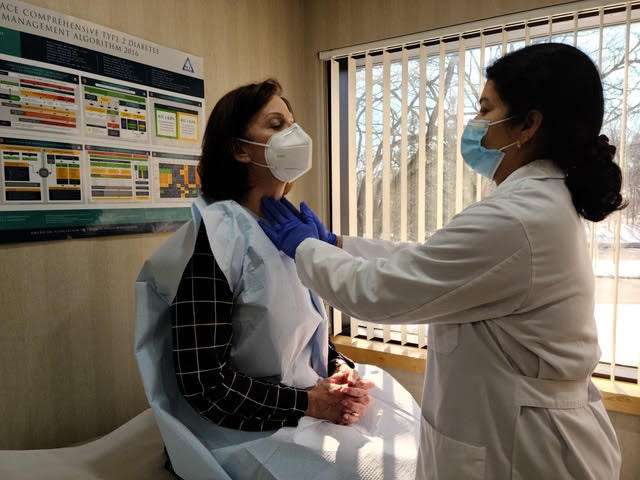Thyroid Diseases
Thyroid Diseases

The thyroid is a small gland found at the base of the neck, just below the Adam’s apple. It affects many aspects of our general health status such as metabolism, heart, bowel, brain and fertility. Problems can develop if the gland is either overactive (hyperthyroid) or underactive (hypothyroid).
When evaluating one’s thyroid status, ordering a screening blood tests such as TSH (thyroid stimulating hormone) and examining the thyroid starts the process. If the doctor feels a nodule, we perform a (FNA) fine needle aspiration biopsy to find out what caused it. Understanding abnormalities in blood tests and possible causes of thyroid diseases can be challenging and requires expert care.
Thyroid Ablation
Radioactive Iodine treatment has been used to treat patients for Hyperthyroidism for over 6 decades.
This has shown to be generally safe approach to treat by destroying the thyroid cells that make thyroid hormone. It is administered by mouth, usually in a small capsule that is taken once and then gets into your bloodstream and is taken up by the overactive thyroid cells. The result is that the thyroid gland or thyroid nodules shrink in size and the excess level of thyroid hormone in the blood returns to normal or low which then if needed can be easily treated with a thyroid hormone supplement once a day.
Thyroid RFA (Radio Frequency Ablation)
Thyroid RFA is an FDA approved non-surgical procedure that shrinks the nodules without compromising thyroid function. This is a minimally invasive percutaneous treatment of benign solid thyroid nodules that results in thermal tissue damage and fibrosis leading to shrinkage of the nodule.
After thorough assessment and evaluation by the Thyroid Specialist Physician, it can be determined if one is an appropriate candidate for the Thyroid RFA instead of having to go through Surgery.
Endocrinologists have the deepest insight in the evaluation of thyroid disease. At GDE, we follow professional societies’ guidelines (such the American Association of Clinical Endocrinologists [AACE], and the American Thyroid Association [ATA]) to assure the correct diagnosis leading to personalized treatment.
